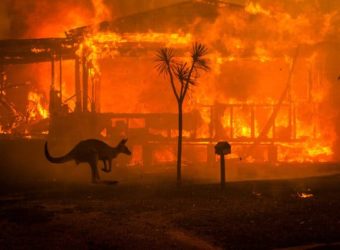Activism in the Age of Climate Grief
The stories are everywhere. Wildfires transforming the landscape of Australia and threatening the Amazon rainforest. Warming ocean waters helping create mega-storms that devastate vulnerable communities. Politicians who not only ignore the clear threats (and the supporting science) but seem to glory in ignoring them.
In the face of such a relentless assault of sad, infuriating, and frightening news, many people turn away Or, at least, choose to learn only the broad outlines of an issue, not the details. For many of us (for I plead guilty to doing this), the only way to stay politically and socially active at all is to fight off the feeling of helplessness—even of despair—that all the details on the news can bring.
But what of the young people who are turning toward these stories, wanting to learn more, not less? Who are majoring in environmental studies, marching in science marches, fighting to change their schools’ environmental policies and investments?
As a writing mentor for many years, I’ve met countless such young people—strong, determined, undeterred. For many of us (again: guilty as charged) they provide our hope for the future, the generation that will finally begin to clean up the ecological messes every previous generation has made.
But that is asking so much, requiring them not only to reckon with an ever-mounting problem but also to overcome the emotional and psychological challenges that accompany the effort. How do they do it? Is it even possible to balance activism and health in the era of climate grief?
I recently talked this over with Delia Walz, a 2018 graduate of Croton-Harmon High School who is now a second-year student and Environmental Studies major at Oberlin College in Ohio. After joining efforts to transform CHHS’s policies on paper use, sale of plastic water bottles, and other issues, she chose to take on the new challenges college’s bigger stage provided.
In making that choice, she came head to head with the emotional cost of doing so. Climate grief is real and ever-present among the students she knows, she says. “It identifies an existential sadness people feel,” she says. “We see students leave the Environmental Studies major because they don’t want to be experiencing these feelings every day.”
On a larger scale, studies show that anxiety about the future is rampant among young people today. A 2017 report by the American Psychological Association said that, alongside the immediate psychological impacts of climate-related disruption due to storms and other threats, “gradual, long-term changes in climate can also surface a number of different emotions, including fear, anger, feelings of powerlessness, or exhaustion.”
Delia has learned that it helps not to take on the burdens alone. At Oberlin, she has become part the school’s branch (called a hub) of the nationwide Sunrise Movement, which advocates and demonstrates for initiatives (including the Green New Deal) to battle climate change and other ecological threats.
A big part of the Oberlin hub’s goal, she said, is to break out of the college “bubble” and work closely with Ohio’s Senator Sherrod Brown, other elected officials, and—crucially—workers who may be suspicious of what such efforts will mean for their jobs. “We have to connect with the unions,” Delia says, “and discuss the safe, well-paying jobs that will be available to them with the development of new technologies through green initiatives.”
In addition, on a college-wide and personal level, Delia says, “We have to work to give support to those who most need it.” One way Oberlin students have done this is to successfully advocate for the establishment of a human-resources position at the school’s Sunshine hub. Its purpose is to help students address their emotional needs.
Other, and timeless, ways of surviving include bonding with other students without talking about the issues at hand. “If you always look directly at the sadness you feel,” she says, “you won’t be able to get out of bed in the morning. But you also can’t succumb to a feeling of guilt if you’re not always looking at it directly.”
Simply taking a break, turning one’s brain off for a little while with TV or another distraction, can make all the difference. “To keep yourself from burning out,” Delia says, “sometimes you just need an hour to be mindless.”
(Among her current escapes—and mine—is “The Good Place,” a TV show with the encouraging belief that people are essentially good, and can change their behavior to improve.)
Yet despite all the challenges they face—both without and within—Delia and so many others remain steadfast in their desire to stay on the path they’ve chosen, to bring about essential change. “I can’t imagine not working together with others towards our common goals,” she says. “They’re too important.”
For the rest of us, those are heartening words, providing strength and determination as we confront our own climate grief.
© 2020 by Joseph Wallace

